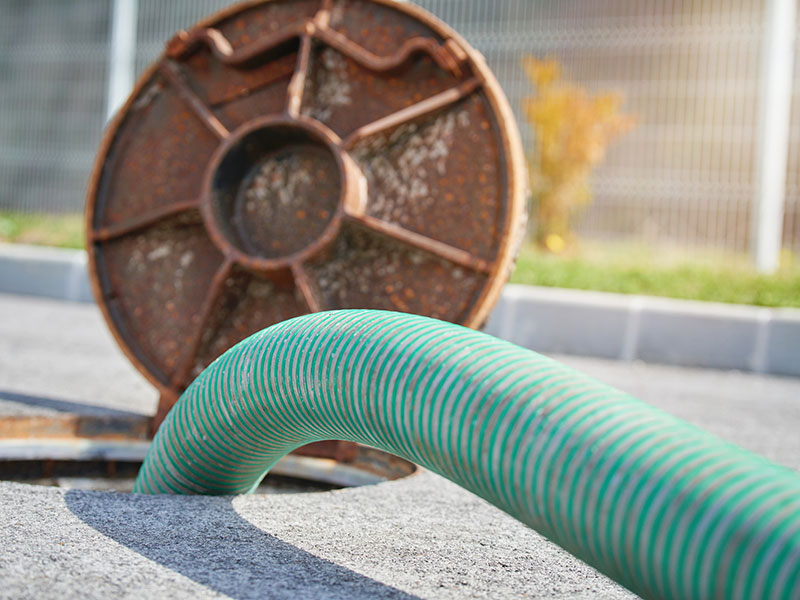Septic Tank Cleaning
If you live in a rural area and your home is not connected to mains drainage it is likely to have a septic tank. When working properly a septic tank provides an effective way of treating wastewater from baths, sinks and toilets. Review the Do's and Don’ts of Septic Tanks The purpose of a septic tank is to treat wastewater from a house or several houses which are not connected to the mains drainage system. It is usually either a large rectangular box made of brick, stone or concrete or a bottle-shaped plastic tank buried underground not far from the property it serves. A septic tank works like a simple sewage treatment works and the treated effluent drains from the tank’s outlet pipe normally to a soak away or stream.
Waste Material
Waste material can settle in the tank and is digested by natural bacteria which must be allowed to breed within the tank. Over time partially decomposed solids build up on the bottom of the tank. This sludge has to be removed regularly to make sure the tank continues to work properly and to prevent the soak away becoming choked.
De-sludging should normally take place every twelve months. However, experience has shown that, depending on the tank’s size and usage, this period may be extended but not normally beyond two years.

Septic Tank Emptying
Drainclear 24/7 provides a septic tank emptying service where it is reasonably practicable to do so. If you are an owner/user of a private septic tank the quality of the discharge and its impact on the environment are your responsibility. You may be held accountable for any pollution caused by your septic tank. You are also responsible for ensuring that:
- The septic tank is properly maintained and emptied regularly
- The septic tank access lids are secure and in good working order
- The drains to and from the septic tank, including the soak away, are free-flowing and free from blockages
When a septic tank does not function properly it can cause odour nuisance, flooding and pollution. When a septic tank or its soak away fails it may be determined a statutory nuisance under Section 79 of the Environmental Protection Act 1990. A notice may be served requiring the person responsible for the septic tank to ensure that any nuisance is removed. The Scottish Environmental Protection Agency may also act if a watercourse is being affected.
Do's
- Have your septic tank system professionally fitted, following local guidelines and regulations
- Put all your wastewater from your home into the system
- Know where your septic tank and drainage field are located
- Have your system inspected regularly
- Desludge the tank when necessary
- Act immediately if you find a blockage or any sign of a problem
- If necessary, seek professional help (see "Drain and pipe cleaning, Plumbers merchants or Sewage Consultants" in the telephone directory)
- Keep note of any maintenance work
- Ensure all manhole covers are accessible
- Ensure that any air vents are not blocked
- Keep the drainage field protected
- Divert other sources of water, like roof drains, away from septic tank systems
- Wash dishes in a dishwasher whenever possible (fat is converted into soap in a dishwasher)
- Use toilet fresheners, mild detergents, fabric conditioners and washing powders and liquids in moderation without upsetting the natural balance of the septic tank. All active ingredients in soap and detergents should be biodegradable by law and should be safe for septic tanks in normal use
- Use bleaches and disinfectants - but please use them sparingly - as they can kill the friendly bacteria which make the septic tank work
Don'ts
- Fats, oils or heavy grease should not be poured down the drain
- Paints, solvents and motor oils should not be put down the drain
- Never dispose of garden chemicals and pesticides into the septic tank
- Don't use the toilet or kitchen sink as a rubbish bin
- Don't empty chemical toilets into drains or septic tanks
- Nappies, sanitary items, plastic or similar items should not be disposed of into the system - "bag it and bin it" instead
- Don't dig or drive over the drainage field, or cover it with a hard surface
- Don't block air vents
- Don't desludge your tank too often
- Don't allow effluent to collect on the surface of the ground
- Enter a septic tank - dangerous gases are produced by the natural treatment process
Registered in Scotland | Company Number: SC341703
